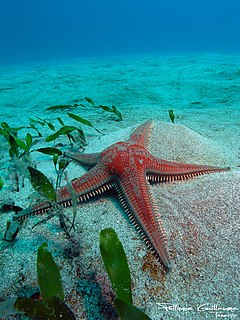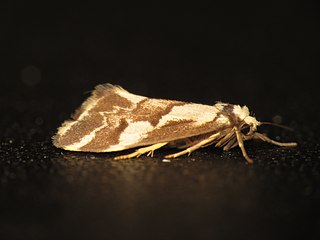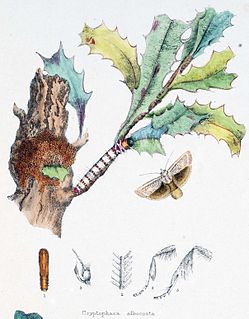Related Research Articles

William Vincent Lucas was a U.S. Republican politician.

Astropecten is a genus of sea stars of the family Astropectinidae.

Philenora is a genus of moths in the subfamily Arctiinae. The genus was erected by Rudolph Rosenstock in 1885.
Schistophleps is a genus of moths in the family Erebidae first described by George Hampson in 1891.

Philenora elegans is a moth of the subfamily Arctiinae first described by Arthur Gardiner Butler in 1877. It is found in Australia.

Lesmone is a genus of moths in the family Erebidae. The genus was erected by Jacob Hübner in 1818.

Leucania is a genus of moths of the family Noctuidae first described by Ferdinand Ochsenheimer in 1816.

Jodis is a genus of moths in the family Geometridae.
Arhythmacanthidae ia a family of parasitic worms from the order Echinorhynchida.

Lichenaula is a genus of Australian moth of the family Xyloryctidae.
Copelatus irregularis is a species of diving beetle. It is part of the genus Copelatus in the subfamily Copelatinae of the family Dytiscidae. It was described by W. J. Macleay in 1871.

Rhizophagus irregularis is an arbuscular mycorrhizal fungus used as a soil inoculant in agriculture and horticulture. In addition, it is one of the best mycorrhizal varieties of fungi available to mycoforestry, but as it does not produce fruiting bodies it "has virtually no market value as an edible or medicinal mushroom"

Philenora chionastis is a moth in the subfamily Arctiinae. It was described by Edward Meyrick in 1886. It is found in the Australian states of Queensland and New South Wales.
Philenora omophanes, the delicate philenora, is a moth in the subfamily Arctiinae. It was described by Edward Meyrick in 1886. It is found in the Australian states of New South Wales and Victoria.
Philenora pteridopola is a moth in the subfamily Arctiinae. It was described by Turner in 1922. It is found in Australia.
Philenora undulosa is a moth in the subfamily Arctiinae. It was described by Francis Walker in 1857. It is found in Australia.
Philenora lunata is a moth in the subfamily Arctiinae. It was described by Thomas Pennington Lucas in 1890. It is found in Australia.

Cryptophasa is a genus of moths of the family Xyloryctidae.
Neodiplothele is a genus of South American brushed trapdoor spiders first described by Cândido Firmino de Mello-Leitão in 1917.
References
- ↑ Savela, Markku (7 December 2015). "Philenora irregularis (Lucas, 1890)". Lepidoptera and Some Other Life Forms. Retrieved 24 October 2019.
| This Lithosiini-related article is a stub. You can help Wikipedia by expanding it. |